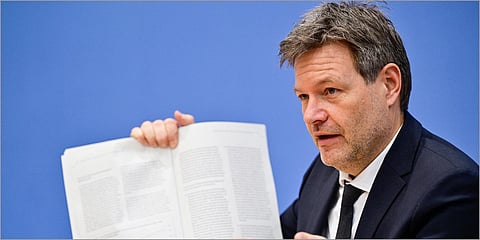

FRANKFURT: The German government on Wednesday lowered its economic growth forecast for 2022 as an Omicron-fuelled surge in coronavirus cases holds back Europe's industrial powerhouse. The country's gross domestic product is now estimated to expand by 3.6 percent, down from 4.1 percent in a previous forecast.
The start of the year "will still be subdued due to the coronavirus pandemic, especially in the service sectors", the economy ministry said in a report. But the bounce-back in Europe's biggest economy should "noticeably" pick up pace once infections level off and global supply chain frictions "gradually" ease over the course of 2022.
The ministry's forecast is more pessimistic than that of the Bundesbank central bank, which is pencilling in 4.2 percent growth this year.
Germany, whose export-oriented economy is particularly vulnerable to the global supply chain bottlenecks and raw material shortages caused by the pandemic, has seen its recovery lag behind other major European economies like France and Italy.
Its flagship auto industry has been hardest hit, with giants Volkswagen, BMW and Daimler forced to trim production over a shortage of semiconductor chips. The German economy is in an "opaque phase", Economy Minister Robert Habeck told lawmakers after the report's publication.
Some sectors "have full order books, others have considerable problems" because of Covid restrictions, he said.
German gross domestic product (GDP) grew just 2.7 percent in 2021, official data showed earlier this month, well below the expected European Union average of around five percent. Despite tightening curbs to slow the virus's spread in recent months, Germany is seeing record numbers of new infections blamed on the highly contagious Omicron variant.
German lawmakers will later on Wednesday begin debating the introduction of a vaccine mandate for adults. The measure is backed by new Chancellor Olaf Scholz from the Social Democrats, but has divided public opinion and sparked street protests.
Economy Minister Habeck, from the Greens, said in the report that "an increased vaccination rate should make it possible to sustainably contain the pandemic" this year and "accelerate the economic recovery".
Consumer spending will be a key growth driver, the ministry said, as businesses gradually resume normal service and meet pent-up demand. Industrial firms can also expect to see higher exports as the global recovery from the pandemic shock continues.
German employment meanwhile is expected to remain robust and workers should see higher wages in response to increased demand and rising inflation, according to the report.
However, the ministry cautioned that "uncertainty" remains about the pandemic's evolution at home and abroad, and the speed at which supply and production issues will be ironed out.
Rising inflation, fuelled partly by soaring energy costs, also remains a risk factor, it said, as it could push central bankers to raise interest rates faster than expected -- which could in turn dampen lending and investment.
The ministry said it expected German inflation to run at 3.3 percent this year, up from 3.1 percent in 2021. The European Central Bank, which is slowly weaning the eurozone off its vast pandemic support, believes inflation will peak this year before falling back below its two-percent target in 2023.
Looking further ahead, Habeck -- who in a first for Germany also holds the climate portfolio -- said the "difficult situation" caused by the pandemic "does not change anything" about the urgent action needed to make Germany's economy greener and more digital.
Scholz's government last month agreed to spend 60 billion euros of unused debt on climate protection and modernising the country, as part of the goal to reach carbon neutrality by 2045. "The investments we make now will pay off in the long run," Habeck said.